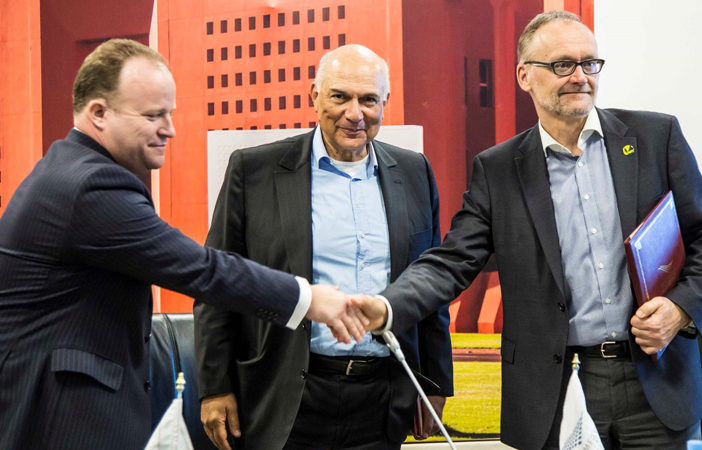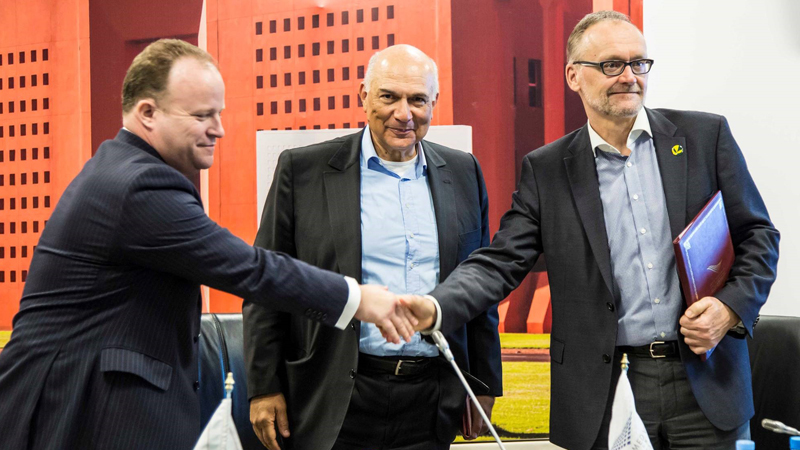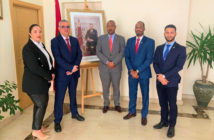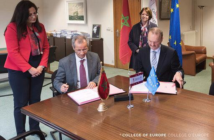Cranfield University
An international academic partnership has today been announced by Mohammed VI Polytechnic University (UM6P), in Morocco, and two of the UK’s leading agricultural research institutions, Rothamsted Research and Cranfield University.
The partnership will be supported by OCP Group, which is one of the
largest exporters of phosphate fertilisers in the world. The announcement comes on the back of growing relations between the UK and Morocco to strengthen collaboration in education, research and innovation fields. Up to 20 Early Career Researchers in the agricultural sector will be supported both in Morocco and in the UK through the partnership.
- Mohammed VI Polytechnic University (UM6P) is a hub of education, research, innovation and entrepreneurship, aspiring to become a solid bridge of knowledge between Morocco, Africa and the world.
- With over 175 years of heritage behind it, Rothamsted Research is a world-leading, non-profit research centre that focuses on strategic agricultural science to the benefit of farmers and society worldwide.
- Cranfield University was awarded its fifth Queen’s Anniversary Prize in 2017 in recognition of its global impact with large-scale soil and environmental data for the sustainable use of natural resources. Cranfield University registered its first Moroccan agricultural student in 1966.
The initial phase of the partnership will focus on the delivery of seven agricultural research projects and the creation of a Centre for Doctoral Training, supporting the development of the next generation of Moroccan scientists and engineers.
During the signature ceremony, Hicham El Habti, Secretary General of Mohammed VI Polytechnic University, said “OCP, through its R&D programme and in close co-operation with the Mohamed Vi Polytechnic University, is developing fertilizers that are specific to the needs of African soils and crops, as well as locally-appropriate service models for African farmers to have reliable, affordable access to these inputs and related products. This vital partnership with Rothamsted and Cranfield University will support the acceleration of this strategy to help African farmers become not only more productive, but also more prosperous.”
Professor Leon A. Terry, Director of Environment and Agrifood at Cranfield University, said: “This partnership brings together the very best in UK plant and soil science with the Mohammed VI Polytechnic University, an institution with the very highest of entrepreneurial and scientific ambitions for Morocco and wider Africa. As a university that prides itself on our international outlook, we are delighted to be bringing Cranfield’s globally-recognised expertise to support the development of African agricultural research.”
Professor Achim Doberman, Director and Chief Executive of Rothamsted Research said, “The development of sustainable agriculture across Morocco, and Africa as a whole, is vital to the continent’s food security and economic growth. The challenges are immense, but by nurturing the talent and enthusiasm of young scientists, I am confident that there can be bright future both for Africa’s famers and its environment. By combining the cutting-edge expertise of Rothamsted and Cranfield, with the drive and vison of UM6P, we can play a major role in delivering this and we are excited about contributing our unique expertise.”
The seven research projects that the partnership will conduct are:
– Exploitation of beneficial root-associated bacteria in grain cereal-based cropping systems
– New soil and plant diagnostics tools for better fertilizer recommendations
– Technical and practical innovations to reduce soil and water losses by improving soil physical properties
– Developing innovative remote sensing/automated crop phenotyping methods for African agriculture
– Bioproducts for African Agriculture
– Dynamic Landscapes
– Novel fertilizer formulations and management for African agriculture
Agrifood at Cranfield
Agrifood has been a key strategic theme at Cranfield University for over 40 years. We have internationally recognised expertise across both domestic and international food supply chains from primary food production, inputs – soil, plants and water, through to point of sale, waste reduction and applied informatics.
Students work closely with our partners in industry, Government or the NGO sector. We understand our clients’ challenges because more than 80% of the University’s business comes from sources other than Government. Most of our academic staff have spent considerable portions of their career in industry or Government, and are especially solution-oriented. We delight in assembling pan-University teams of experts from across our skill sets, often in collaboration with other Universities, and consultants, to meet challenges that fall outside the conventional academic disciplines.








